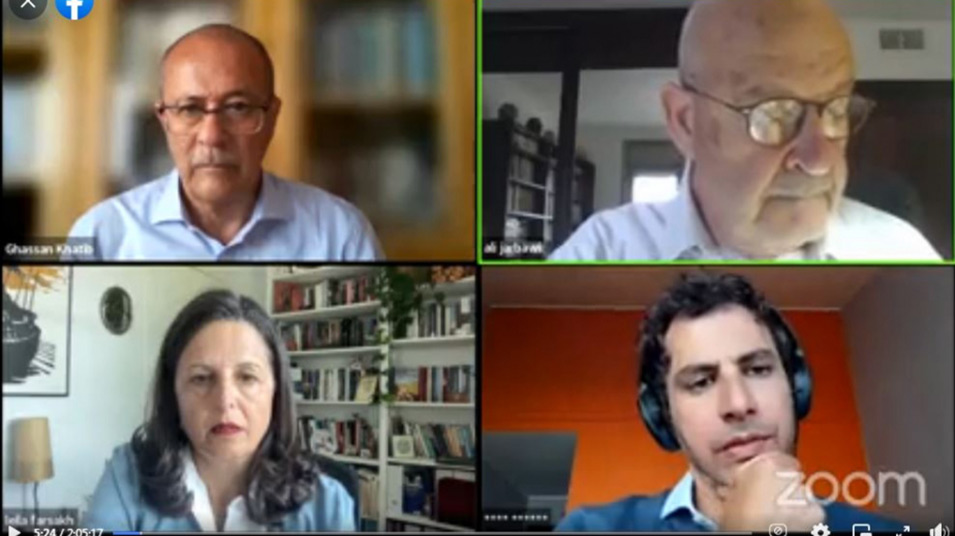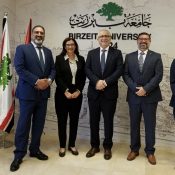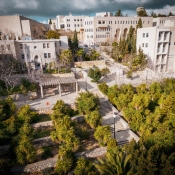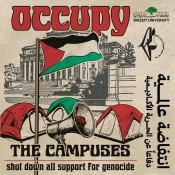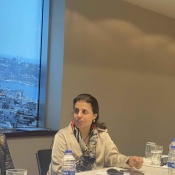Ibrahim Abu-Lughod conference spotlights MENA region instability, status of Palestine
Birzeit University’s Ibrahim Abu-Lughod Institute of International Studies jointly with Konrad-Adenauer-Stiftung concluded their annual international conference, “The Palestinian Cause in a Troubled Region,” on May 26, 2022.
The four-day conference examined the rivalries of major powers in the MENA region and how this impacts Palestine, as explained in the opening remarks by Dr, Ali Jarbawi, conference director and professor of political science and international studies at Birzeit University.
Abeer Zaghari, representing Konrad-Adenauer-Stiftung, emphasized the importance to delve into key subjects through the conference that would affect the future of Palestinians who live under prolonged Israeli occupation.
Each day of the conference—virtually accessible via Zoom and the Birzeit University Facebook page—focused on themes aimed at understanding the shifts in the global balance of powers in the Middle East amid the decline of American hegemony in the region, and the change in the roles of regional powers, especially Arab regimes.
The first day’s session, focused on international rivalries in the region, was moderated by Ibrahim Farahat, associate professor at Doha Institute for Graduate Studies.
Speakers included Charles Kupchan, senior fellow at the Council on Foreign Relations; Ross Harrison, senior fellow and director of research at the Middle East Institute; and Thomas Demmelhuber, professor of Middle East Politics and Society at the Friedrich-Alexander-University of Erlangen-Nürnberg. The guests examined several root causes and consequences of these regional rivalries by applying a historical lens to regional transformations. The speakers also delved into the complex interplay amongst them to explain the current disorder in the region.
The second day, moderated by Yaser Amouri, assistant professor at Birzeit University’s Department of Law, highlighted the rivalries in MENA.
Marwan Kabalan, researcher at the Arab Center for Research and Policy Studies and chairman of the Gulf and Arabian Peninsula Studies Forum, touched on the rising enmity among regional states in the past decade. Some of these factors included: the colonial division of the Middle East that helped intensify fragmentation between its countries; the complex interplay of political and ideological factors created by the Soviet Union and the United States during the Cold War; and the tendency of Arab counties to cluster around one of the two global powers.
Kabalan exemplified the undeniable role of these external actors in regional conflicts amid the absence of a clear democratic Arab leadership. Arabs, he added, are fragmented, allowing global powers to contribute to regional rivalries.
Tariq Dana, assistant professor at the Doha Institute for Graduate Studies, discussed the United Arab Emirates and its normalization with Israel, explaining the motives behind this agreement. Both parties are eager to further their cooperation on economic and security issues amid geopolitical changes. The rising role of Iran in the region, according to Dana, is one of the major threats to their interests.
On the third day, speakers explored the Arab region as a turbulent zone and predicted upcoming challenges amid rivalries and instabilities caused by both internal and external factors. Talks were moderated by Dr. Lourdes Habash, assistant professor of international relations at Birzeit University.
Abdel-Fattah Mady, associate professor of political science at Alexandria University, Egypt, explained the causes for democratic transformational failure in Arab countries: the social and political institutional structures, types of the political systems and the nature of the dominant political elite. This is reflected in the Arab Spring of 2010–11.
Dana El Kurd, assistant professor of political science at the University of Richmond, explored the relation between normalization with the future of Arab communities. She said that “peace” agreements between Arab regimes and Israel converge around policies designed to preserve authoritarian rule in the Arab countries.
The concluding session, presented by Oraib Rantawi, founder and director of the Amman-based Al Quds Center for Political Studies, showed that the Arab Spring revealed the corruption of Arab regimes, leading to low levels of public confidence in Arab governments.
The final day, moderated by Dr. Ghassan Khatib, associate professor of cultural studies at Birzeit University, involved the status of the Palestinian cause amid current regional turbulence.
Tareq Baconi, president of the board of Al-Shabaka, explained the structural transformation in the MENA region that has unleashed multi-faceted conflicts among regional actors.
Proxy wars, the failure of the Arab Spring and the continued normalization agreements between Arab regimes and Israel are also among the factors that have shown changes in the geopolitical structure of the MENA region.
Leila Farsakh, Palestinian political economist at the University of Massachusetts Boston, highlighted the regional and international changes that affect the Palestinian cause, especially after the disengagement of the United States from and shift in its policy about the Middle East in 2012. This, according to Farshakh, has given the chance for Iran and Israel to compete on a regional hegemony to maintain their power, security and interests.
Among the changes is the Russian-Ukrainian war, added Farsakh. She pointed out that the area is impacted by war in Europe via their food security, energy prices and job markets. Moreover, regional governments, including America’s traditional allies, are hedging between Russia and the West, which echoes a new cold war, added Farsakh.
Dr. Jarbawi concluded the conference by highlighting the history and political development of the Palestinian cause. Jarbawi argued that the Zionist project was built on Western myths and is supported by global dominant powers—and unlimited political, financial and diplomatic aid.
Israel, according to Jarbawi, lives under constant fear that it might lose control, no matter the strength of its military. That is why we notice an intensifying aggressive campaign against the Palestinian flag, underscoring that Israel is a failed project.

